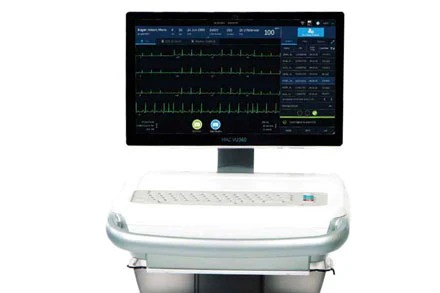
In the ever-evolving world of healthcare, diagnostic imaging plays a pivotal role in identifying and understanding medical conditions. Among the various imaging technologies available today, ultrasound stands out for its non-invasive nature and versatility. One of the leading names in the ultrasound market is Philips, a company renowned for its commitment to advancing medical technology.
At Heart Medical, we understand the importance of reliable diagnostic tools. In this blog, we will explore the features, benefits, and innovations of Philips ultrasound machines, helping healthcare providers make informed decisions when it comes to selecting the right equipment for their practices.
The Role of Ultrasound in Modern Healthcare
Ultrasound technology has been a cornerstone in the medical field for decades. Its ability to create real-time, high-resolution images without exposing patients to harmful radiation makes it a go-to choice for many diagnostic purposes. Ultrasound machines are widely used in various fields, including obstetrics, cardiology, musculoskeletal imaging, and emergency care.
With continuous advancements in technology, ultrasound machines have become more compact, user-friendly, and accurate, contributing significantly to patient outcomes. Philips ultrasound machines are at the forefront of these innovations, offering a comprehensive range of features designed to improve diagnostic efficiency.
Why Choose Philips Ultrasound Machines?
1. Superior Image Quality
One of the primary reasons healthcare professionals choose Philips ultrasound machines is their exceptional image quality. These machines utilize advanced imaging technologies, including Crystal Clear Imaging (CCI) and PureWave Technology, to deliver sharp, detailed images. This allows physicians to make accurate diagnoses based on clear, high-resolution visuals of the body’s internal structures.
The superior image quality offered by Philips ultrasound machines ensures that even the most challenging cases are captured with precision, enabling clinicians to detect conditions at an early stage.
2. Ease of Use and Intuitive Interface
The ease of use is another significant advantage of Philips ultrasound machines. These devices are designed with a user-friendly interface, making them accessible for both seasoned professionals and those who are newer to ultrasound technology. With intuitive touchscreen controls and customizable settings, healthcare providers can adjust the machine to their preferences and needs with minimal effort.
Additionally, Philips ultrasound machines often come with automated measurement tools, further simplifying the diagnostic process and reducing the chances of human error.
3. Portability and Flexibility
In today’s healthcare landscape, portability is essential. Many Philips ultrasound machines are designed with portability in mind, offering lightweight, compact units that are easy to move and store. Whether used in a hospital, outpatient clinic, or even in field-based situations, these machines are highly adaptable.
Models like the Philips Lumify provide flexibility for clinicians working in point-of-care settings, allowing them to perform ultrasounds on the go using smartphones or tablets. This is particularly beneficial in emergency situations or when working with critically ill patients who may not be able to move to a designated imaging area.
Key Features of Philips Ultrasound Machines
Philips ultrasound machines offer a variety of innovative features designed to improve diagnostic accuracy and streamline workflow. Let’s take a closer look at some of these standout features.
1. Crystal Clear Imaging with PureWave Technology
Philips ultrasound machines feature PureWave Technology, which produces exceptional image clarity by reducing noise and distortion. This technology uses advanced transducers to capture high-resolution images, even in challenging anatomical areas. Whether imaging dense tissues or small organs, PureWave ensures that every detail is visible.
2. Elastography for Liver Stiffness Measurement
Liver diseases such as cirrhosis can often go undetected in the early stages. To address this, Philips ultrasound machines incorporate elastography technology, which helps assess liver stiffness. This non-invasive test can help detect liver fibrosis, enabling early intervention and better management of liver conditions.
3. 3D/4D Imaging
For obstetricians and gynecologists, the ability to visualize the fetus in 3D/4D can significantly enhance the diagnostic process. Philips ultrasound machines offer 3D/4D imaging capabilities, providing detailed visualizations of the fetus’s development in the womb. This technology is not only valuable for monitoring pregnancy but also for detecting potential abnormalities early on.
4. Needle Guidance for Procedures
Philips ultrasound machines are equipped with needle guidance capabilities, improving the accuracy and safety of needle-based procedures such as biopsies or injections. These features help clinicians ensure that the needle is inserted at the correct angle and depth, minimizing risk and improving patient outcomes.
Benefits of Philips Ultrasound Machines for Healthcare Providers
1. Enhanced Diagnostic Confidence
With their superior imaging quality, Philips ultrasound machines provide healthcare professionals with the confidence to make accurate diagnoses. Whether evaluating cardiac health, monitoring fetal development, or diagnosing musculoskeletal conditions, these machines help physicians make better decisions that lead to improved patient care.
2. Streamlined Workflow and Productivity
Philips ultrasound machines are designed to optimize workflow, making them a valuable tool for busy healthcare facilities. With features such as automated measurements, customizable settings, and user-friendly interfaces, these machines reduce the time spent on each scan, allowing healthcare providers to see more patients and deliver faster results.
Moreover, many Philips ultrasound machines are compatible with electronic health record (EHR) systems, enabling seamless data transfer and improving overall efficiency.
3. Cost-Effectiveness
Although high-end ultrasound machines can be an investment, the advanced features and durability of Philips ultrasound machines make them a cost-effective choice in the long run. These machines offer excellent performance, reducing the need for frequent repairs or replacements. Additionally, the efficiency gains from improved diagnostic capabilities can help healthcare providers save time and resources.
Applications of Philips Ultrasound Machines in Various Specialties
1. Cardiology
Philips ultrasound machines play a crucial role in cardiology, helping physicians evaluate heart function, detect abnormal blood flow, and identify structural issues within the heart. The Philips EPIQ ultrasound system, for instance, offers advanced imaging capabilities that allow cardiologists to assess the heart’s anatomy and function with great accuracy. This is vital for diagnosing conditions such as heart failure, valve disease, and congenital heart defects.
2. Obstetrics and Gynecology
In obstetrics and gynecology, ultrasound technology is indispensable for monitoring pregnancy, assessing fetal health, and guiding procedures like amniocentesis. Philips ultrasound machines, with their 3D/4D imaging and advanced fetal monitoring capabilities, offer obstetricians the tools they need to ensure both maternal and fetal well-being.
3. Musculoskeletal Imaging
For musculoskeletal specialists, Philips ultrasound machines provide high-resolution imaging that helps diagnose soft tissue injuries, joint problems, and conditions such as arthritis. The ability to visualize ligaments, tendons, and muscles in real-time aids in making accurate assessments and planning treatment strategies.
4. Emergency Medicine
In emergency settings, time is critical. Philips ultrasound machines are designed for fast, efficient imaging, making them an essential tool in emergency medicine. Portable models, like the Lumify, allow doctors to perform ultrasounds at the bedside, facilitating quick decision-making and improving patient outcomes in critical situations.
Choosing the Right Philips Ultrasound Machine for Your Practice
When selecting an ultrasound machine, it’s important to consider your specific needs, such as the types of procedures you’ll be performing, your budget, and the space available in your clinic or hospital. Philips offers a range of models to suit various medical specialties, from compact portable machines to advanced systems with cutting-edge imaging capabilities.
At Heart Medical, we specialize in providing high-quality medical equipment, including Philips ultrasound machines. Our expert team can help you choose the right model based on your specific requirements and budget. We also offer installation, training, and ongoing support to ensure that your ultrasound machine operates at peak performance.
Conclusion
Philips ultrasound machines have earned their reputation as reliable, high-quality diagnostic tools. Their advanced features, including superior image quality, portability, and ease of use, make them an excellent choice for healthcare providers across various specialties. Whether you’re working in obstetrics, cardiology, musculoskeletal imaging, or emergency care, Philips ultrasound machines can enhance your diagnostic capabilities and improve patient outcomes.
If you’re considering upgrading or investing in new ultrasound technology, Heart Medical is here to help you navigate your options. We provide expert advice, personalized recommendations, and top-notch customer service to ensure you find the perfect ultrasound machine for your practice.

0 Comments
Post Comment